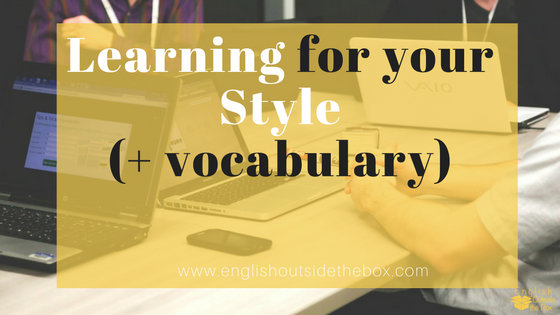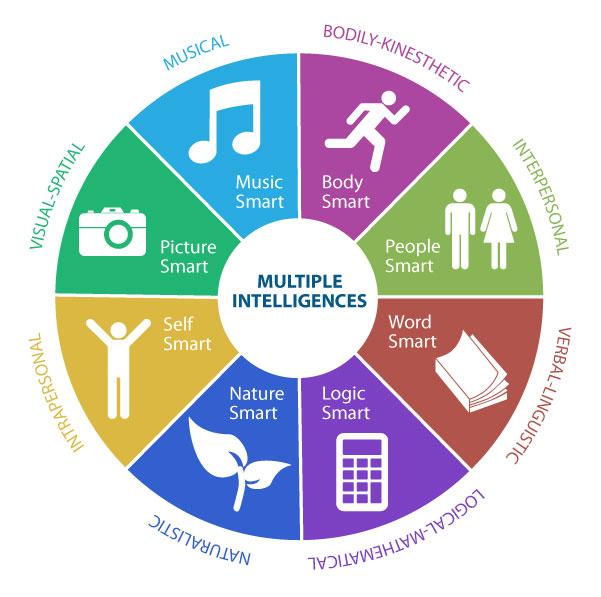
Learning for your Style (+ Vocabulary)
Happy Sunday! I’m excited for today’s post because it’s going to help everyone, and allow all of you to find out your individual learning style, and hopefully improve your educational experiences! Once you find out your learning style from the provided quiz, I will provide a few activities for each strength as a way to improve your language skills! 

photo: Connections Academy Blog
All of you have unique learning styles, meaning everyone learns in their own way, and has different strengths and weaknesses. Some people learn better alone, while others need a group for support and guidance. Some people need pictures, like me, and visual stimulation to remember information, but others get distracted and would prefer not to have a lot of color and photos. All of these differences make us unique, and when we know what our learning style is, we can learn and practice in a way that highlight our strongest skills. Here are the different skills an individual can have:
* Bodily-Kinesthetic (body smart): you learn best through touch and moving, using the body to understand information. You need to be up and moving.
* Interpersonal (people smart): you prefer to work on a team, are a good leader and team player. You need to share information and work together with others to understand.
* Verbal-Linguistic (word smart): you need words to learn: reading, writing, listening, and speaking. You learn best by reading something and then discussing it.
* Logical-Mathematical (logic smart): you learn best by categorizing information. You think by classifying information, thinking about the sensible logic, and then, reasoning it.
* Naturalistic (nature smart): you work best outside, in nature. You enjoy learning about natural events, or things related to life.
* Intrapersonal (self smart): you need to work alone. This doesn’t mean you are shy, but independent and must work with your individual goals.
* Visual-Spatial (picture smart): you prefer to draw, or imagine and (visualize) things. Anything with a picture helps you understand, including charts and diagrams.
* Musical (music smart): you need music in your learning, and enjoying listening to it, singing it, or finding the rhythm and melody.
The quiz will take about 5-10 minutes, and below I have included some explanations and definitions for anything I thought might be difficult. Make sure you read each section’s question, because each of the 4 sections ask something different. After the explanations below, I will give some activities for each style, so make sure you keep scrolling down. ↓ ENJOY! ♥
Page 1: How much time do you spend: This question wants to know the amount of time you really do on these activities regularly. Think about your ‘average’. The choices are: none (no time), only a little (sometimes), a fair amount (more than sometimes), a lot (often), all the time (almost-always)
- to get lost in a book: give so much attention to your book, and forget about everything else around you.
- crafts: things you make with your hands
- mysteries: things that are unknown
- riddles: difficult questions that are like a game
- reflecting: to think very carefully about something
- yearning: to strongly desire or want something
Page 2: How keen would you be to: This question wants to know how interested you are in the things listed. Keen means excited and interested in. The choices are: I’d hate to (not interested at all), I’d be a little reluctant (you are not very interested, but maybe), I wouldn’t mind (you don’t care if you do or don’t), I’d like to (interested), I’d jump at the chance (very very interested).
- reluctant: having doubt about doing something
- self-improvement: something that makes you, as a person, better (improves)
- look after: give care to, take care of
Page 3: When you are in a group, how often do you find yourself: This question wants to know your behavior (the way you act) in a group of people (not alone). The choices are: none (you never do it), only a little (sometimes), a fair amount (more than sometimes), a lot (often), all the time (almost-always).
- speaking on behalf of the group: you speak for the group, and represent them and what they want to say. The group tells you what to say for them.
- navigating or reading a map: you lead the way and give the directions. You read the map to tell the others where to go.
- role: position
- acting a role/impression: pretending to be a different person, behaving like someone else.
Page 4: How well do these statements describe you: This question wants to know if the information describes how you are and what you do. The choices are: Not me at all (not you, never), a little like me (kind of, sometimes), moderately like me (sometimes, often), a lot like me (yes, very me), exactly like me (this is me!).
- figure out people: try to understand people (who they are, and why they behave the way they do).
- set goals: say what you want to achieve/accomplish.
- gardening: working with plants in a garden(area where plants grow).

* Bodily-Kinesthetic
- games that involve your body will be fun and help you learn. Simon Says, Charades, Twister, etc…
- scavenger hunts. Look online, ask a teacher (ME), or create your own list of objects to be found by using clues. Relate this to a theme or your current vocabulary.
- practice your language, and entertain others while putting on (or going to) a magic show. Step by step instructions can be reviewed, imperatives, and again, target vocabulary.
- the use of realia or real life objects will help you. Plastic fruits and vegetables will work better than flashcards, or real clothing and costumes more than pictures. Use your theme to guide you to a place (ie: travel to a local guide shop, food to the grocery store, etc…)
- turn your songs, vocabulary, or current theme into movement. Think dances, plays, acting, etc…
* Interpersonal
- interviews! Use other people to gain knowledge, and give your knowledge to them, too. Ask experts in a field about something your interested in, review vocabulary and grammar concepts that you form into interview questions.
- teach others information that you would like to review, you’re practicing speaking, interacting with others, and helping out a friend.
- studying in groups, review in groups, learn in groups. Organize your own club with some people interested in English and set a time to meet each week.
- nominate yourself as the leader of any group you participate in, and take charge!
- role playing or participating in a play will help you practice language and get you around others.
* Verbal-Linguistic
- word games are an incredible resource to improve English with this strength. Scrabble (Words with Friends), crossword puzzles, or try Boggle!
- say “hello!” to a stranger! Try to start a conversation with someone new, invite others to share and enjoy English with you!
- start a blog, or write on a blog (comment below!), search for blogs, read some blogs, and then...tell someone about the most interesting blog you found!
- write a poem or a story, and enter it into a contest.
- try and debate more. Read the news about some controversial issues that are local, and talk about them.
* Logical-Mathematical
- try logic games, like sudoku, review the numbers in English, and try to think/say (in English) why you are making the decisions you are.
- clue or detective games. Having the opportunity to solve a crime is fun, logically think about evidence and discover the mystery.
- always put new English concepts (grammar, vocabulary, ideas) in categories. Organize your notes in this way to stay organized.
- learn how to play classic math favorites in English, think: Chess, cards, checkers, dominoes.
- find the patterns in everything. Classifying things you read, ie: find similarities in characters of stories, or find analogies of new vocabulary.
* Naturalistic
- volunteer at a local animal shelter, or environment organization. Use your English skills to connect on the Internet to make a difference.
- study outside, learn outside when you can, and use your natural surrounding to educate yourself. Vocabulary, and discussion ideas can be taken from the natural world.
- start an exercise group, where the members must also communicate in English.
- find a new hobby that involve the outdoors. Groupon has new activities to try, or search on “international meetup.”
- National Geographic has a lot of information on the Internet to explore and practice language at the same time!
* Intrapersonal
- blogging, journal or diary writing. Writing your thoughts and self reflecting will help you to express yourself, and improve writing skills.
- create scrapbooks of your favorite memories, with quotes, and information to help you think about it. Using different pictures can help you review vocabulary.
- self-study, and review in a quiet place with no interruptions.
- keep a goal chart, with specific language goals you want to accomplish. Keep track!
- talk to yourself, think out loud, always be self-communicating to practice your language skills. Make sure you know (in English) what you’re always doing..
* Visual-Spatial
- take photographs of new vocabulary, learn new words with what you see around you.
- forget the dictionary or translator, use Google images as your dictionary for unknown words.
- learn with flashcards: there’s a variety of activities you can do: practice, review/test your knowledge, memory game.
- take notes with pictures, cluster ideas in word clouds, mind map when you write to brainstorm ideas.
- use comic strips/cartoons to learn. Remove the original speech and create your own story, or illustrate a story that you have written.
* Musical
- lyricstraining.com is a great way to listen to music and practice listening and writing.
- read information out loud, enjoy the sound of your own voice, and make some chants or songs about the information you are learning.
- create your own song! Use current vocabulary or grammar concepts to write a song. If you think that’s a challenge, start with a poem.
- listen to soft music (minimal words) while you are studying, or reviewing information. This can motivate and energize you!
- podcasts, YouTube, anything that is REAL audio will help you, watch interview of your favorite celebrities, movies, TV, etc…
I hope you found your learning style, and can use some of the activities listed above. Please, share with other learners some of your favorite activities related to your learning style in the comment section here. What works best for you?
Comment, Share, Connect, Like, inspire yourself and others to learn..
♥♥♥ Happy Studying my favorite Bloggers! ♥♥♥
The Conversation Club will provide you with 6 group conversation calls to practice with a real teacher and a group message community to connect with other members.
You will also get weekly English lessons to help your vocabulary, listening, reading, pronunciation, and more!
Try the Club for 1 week, free! Join the 1-week free trial here.

[…] Click here to get that lesson. […]
[…] how to learn best for your learning style by finding out your Multiple Intelligence […]
[…] posts: * Music Idioms * Learning for your Style * Improving Speaking […]
Thank you very much…i am so happy and enjoyed it. i learn lots of thing.
That’s so marvelous, Roshan! Happy to hear that! Stay connected!
This is a great article! It’s important to know our favorite learning style before start learning something. As you explained in the article, learning style differs from person to person and choosing the correct learning style is important. That web application has questions to figure out our favorite learning style, that’s fantastic. My favorite learning style is ‘Kinesthetic’ and I believe it’s true. Thanks for this valuable article Jeniffer.
Thanks so much Kosala, I am so happy you enjoyed it! So as a kinesthetic learner, what kinds of activities do you enjoy?